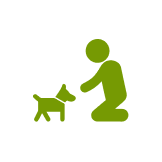In 24 cities

Got your pet vaccinated? Here’s what to do next.
|
|
Time to read 1 min
Get product availability and delivery timelines based on your location.
No saved addresses found
Add an address to see it hereAre you sure you want to delete this address?
Select Delivery Location
Search location
Confirm location
Confirm Location
Add new address
Enter complete address
100% Authentic

Easy return policy

Help us ensure a smooth delivery
Help us ensure a smooth delivery
SIZE GUIDE
Written by: Karan Arora
|
|
Time to read 1 min
Congratulations on getting your pet vaccinated! You’ve taken a big step towards providing a safe and healthy life to your baby, so give yourself a pat on the back.
Vaccinations are injections that contain antigens, which are weaker versions of a disease-causing pathogen. Giving this to your pet helps their immune system develop antibodies, so if they ever get exposed to the pathogen in its full strength, the body is able to fight and recover faster.
Your dogs and cats can be protected by many dangerous illnesses like Parvovirus, Canine distemper, Feline Leukaemia Virus just by vaccinating them at the right time. It is natural for your pet to experience some mild symptoms after getting their shot, so just keep an eye on them. The symptoms usually last for about 2-3 days and your pets will be their happy selves before you know it. It is best to talk to your vet and keep them informed of any prior ailments or reactions to medications so you know what to expect.
Here are a few side effects that are very common after your pet gets vaccinated:
Once your pet has got the shot, they’ll need complete rest for the next 2-3 days, so make a warm and cozy place for them to lie down and relax. Since they may be low on energy, place their food and water by their side so that they don’t have to move around a lot. Don’t be alarmed if they are not very hungry since this tends to happen quite often after getting vaccinated. Lastly, check on them every now and then to make sure they are comfortable. This is a great time to give them some extra hugs and care.
Are there any other side effects that I should be concerned about?
Very rarely, pets who have been vaccinated might show more serious signs. If any of these happen to your pet, consult your vet immediately.
Looking for a new vet? Get on-demand vet consultations from the safety of your home at Supertails.
Share this blog



In 24 cities

Happy pet parents

For every new member

Exclusive
2 item in cart
₹10,360


